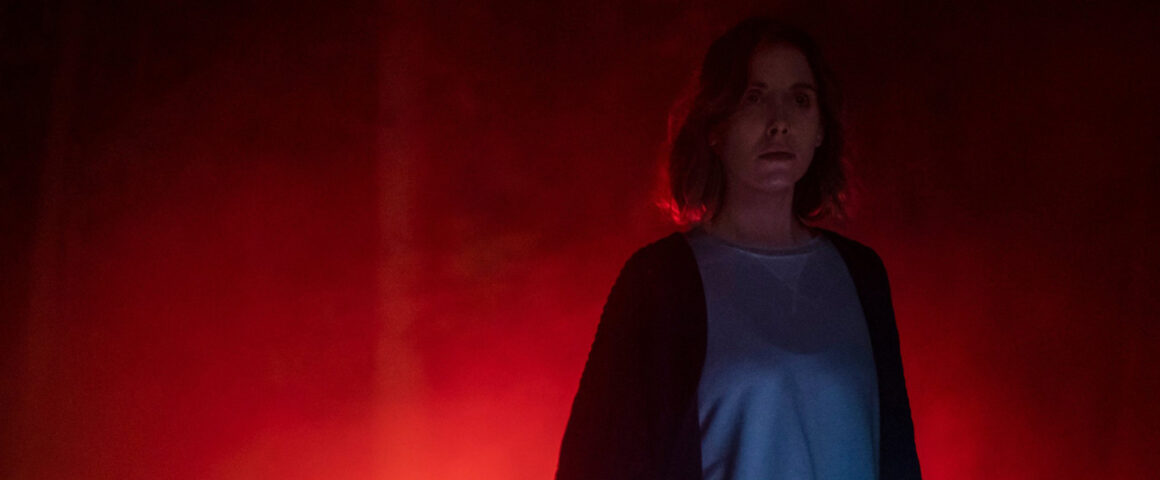The Rental is a film that offers many generic elements. It combines aspects of horror and thriller, and within those we find features of the surveillance and home invasion sub-genres, and also the well-worn slasher. The characters are combinations of private, professional and political concepts, and the clashes between these form much of the drama of the piece. There is also a combination of fears over personal mistakes, remote places and technology. Unfortunately, what the film does not offer is much in the way of tension, thrills or scares, as the various parts fail to add up to a satisfactory sum.
The opening shots of the film express this combination of elements, as the viewer sees eerie shots of waves crashing against cliffs and fog rolling off the ocean. These images of nature merge (literally) with modern technology, as the pictures of the coast fade onto a webpage where Charlie (Dan Stevens, “Colossal”) and Mina (Sheila Vand, “Triple Frontier”) find a place to stay for the weekend. From this first appearance, the viewer could be forgiven for thinking that Charlie and Mina are a couple, but their actual partners quickly appear, Mina’s boyfriend/Charlie’s brother Josh (Jeremy Allen White, “Rob the Mob”), and Charlie’s wife Michelle (Alison Brie, “The Disaster Artist”). However, the lingering impression of that first appearance proves to be significant. A fractious fraternal relationship becomes clear, as do marital tensions. The central quartet are clearly established, although the fissures in their relationships are rather obvious. Everyone seems annoyed with Charlie, and the viewer can easily understand why.
From these introductions we move to a standard trope of horror films, the journey, as our quartet of protagonists set off to their idyllic rental house by the sea. Idyllic to these four at least, but the viewer is likely to find it immediately unsettling. The journey echoes those in “The Shining” and “Get Out,” featuring long shots of the car in expansive countryside and travelling shots of the surroundings. Again like those earlier (and better) films, the house is luxurious and expansive, a desirable location despite our misgivings. Another familiar horror trope is that of the harbinger, the house caretaker Taylor (Toby Huss, “Havenhurst”). Taylor is creepy and judgmental, possibly racist and displays micro-aggressions towards the two couples. This character might encourage our quartet to do the smart thing and run away, but of course they accept his assholery for the sake of a good time.
The initial set-up has potential for an enjoyable unfolding of a steadily more horrific mystery. Sudden appearances and a phone ringing provide jump scares, while sinister noises, a locked room under the house and references to an unseen neighbor are enigmas to be explored. Director David Franco (his first foray behind the camera) and director of photography Christian Sprenger largely use a low-key palette, emphasizing the neutral colors of Meredith Lippincott’s production design. This largely de-emphasized visual design is furthered by the fog that adds to the eeriness of the atmosphere, but also interrupted by moments lit by red taillights that cast a hellish hue over the events. Franco also somewhat obscures the layout of the house, which adds to the mystery but can also jerk the viewer out of the narrative as we wonder “Wait, where are we?” and “Where did that room come from?” He employs images of entrapment such as Josh under a staircase, figures framed by a wooden latticework, Michelle viewed through the grille of an air vent, and these moments set up the film’s conceit of surveillance. This conceit is continued with more explicit references as well as prolonged shots of the characters, the viewer observing them through a detached, voyeuristic gaze (sometimes accompanied with heavy breathing, just in case we missed the pervy implications).
Within this setting, we steadily see the characters fall apart, largely through clumsy traits and obvious motivations. The performers do their jobs adequately, but no one stands out as anything exceptional. Still, there is nothing exceptional to work with, as a vibe established early on is exploited, people sneak around in the dark, a hot tub serves as a metaphor for exactly what you would expect. As a result, indiscretions come as no surprise, the great outdoors and interior modernity form an obvious dichotomy between innocence and sin. Revelations abound, tensions escalate, recriminations pile up, and we think “Yes, and?” There is also a familiarity in the politics of the film, as like the aforementioned “Get Out” as well as the more recent “The Hunt,” the film features white middle-class liberals who transgress (well, slightly) and have to deal with disappointment. Weirdly, the film can be read as being about disappointment, as well as being one itself (meta-disappointment? Is that a thing?). The central characters all have expectations of what their friends can be and how a weekend away will work out — they all encounter disappointment as they receive rude wake up calls.
Through its seeming punishment of their sins, the film could have been titled “I Know What You Did That Weekend,” while also echoing “Hostel” and that gem of referential horror, “The Cabin in the Woods.” Played straight and without the wit, The Rental (or “The House on the Cliff”) is filled with bumbling attempts at cover ups, red herrings that lead nowhere, remote controlled devices that take effect when the narrative requires, a menacing masked figure to move things on a bit, and in case we needed her, a Final Girl. When the violence comes, it’s nasty but not brutal, and weirdly the creepiest section is the end credits where the film resorts to a found footage aesthetic. Overall, The Rental is a big disappointment, deeply mechanical and at times tedious, until it literally falls off a cliff.



